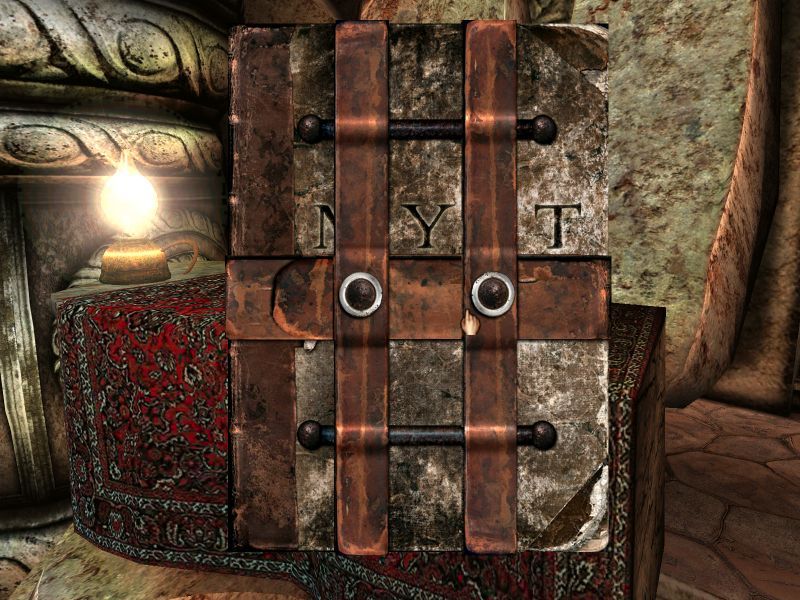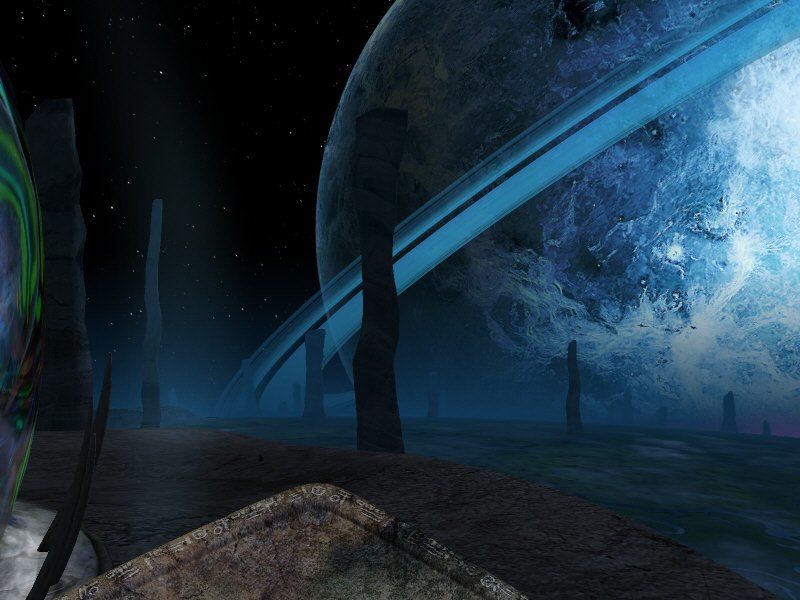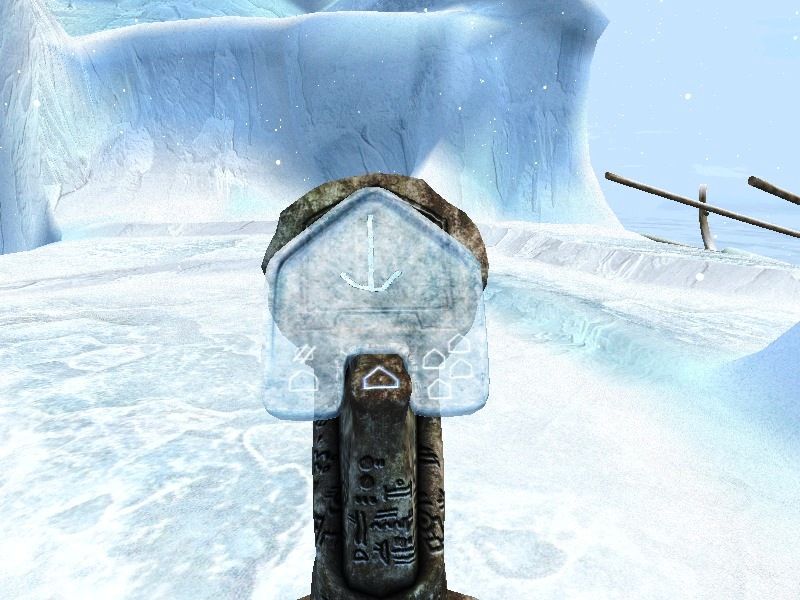What is it?
Every one knows what a Myst game is, don't they? Well, not everyone, which is a shame. And those that do are in for a bit of a surprise with the new Myst game. Myst V: End of Ages comes in a nice white, cardboard sleeved, 3 CD case about the size of a modest fantasy novel. No complex, windowed, multilayered presentation this time, just a nice subtle game box with foldout flap for the blurbs, and a badge proclaiming this to be ‘the Last Chapter'. So… what's inside?
Well, that part took me quite a long time to discover. I'm not sure if there are many people suffering from install problems with Myst V, but I certainly had some. There are three hybrid CDs (PC & Mac), as I've already mentioned. Presumably, the DVD version comes on a single disk. The installer gives you options for a ‘Typical' or ‘Custom' install. The ‘Typical' option installs everything that's available under the ‘Custom' option, including a variety of unnecessary website shortcuts and the equally unnecessary GameShadow – a game demo and dynamic advertising engine that seems more ad-ware than useful software to me, but, as they say, ‘your mileage may vary'.
Next comes the big bit – very nearly 4GB to install the game. Wow, that's a lot, although admittedly, not as much as Myst IV Revelation required.
After three CDs-worth of file copying (and installing DirectX 9.0c if you don't already have it), the installer then sits there for several minutes churning through a large archive file creating a directory of 2GB worth of OggVorbis™ sound files. The first time I installed the game, this process crashed after about 20%. Upon reinstalling, however, it ran through without crashing.
Is there a plot?
The opening of the game is a voiceover from Atrus about the end of his time, and then you arrive in the room in which you finished Myst (assuming you didn't fall into the brothers' trap books, that is). Only this time, the room is gloriously rendered in full 3D. No more slideshows or 360 degree bubbles here. This is what Myst should look like. We've got dynamic reflections on the glassy bits of the floor tiles. There's ornate architecture, strange, dark, unhuman creatures that run off immediately, and finally, there's the old linking book to Myst. Oh, but it's locked. Surely we'll find another book later.
Eventually, after a bit of wandering around, we find a strange bubble with a locked stone tablet at its centre. Again we have a fabulous graphical effect, the ‘soap bubble'. Yeesha has grown up, and once you find her, presents you with a problem. You need to release the Tablet, and in some unspecified way, save the D'ni. She then sends you off by forcing you to link. Huh? Wait a second, where's the book, and the animated image for me to use to link with? This was my first indication that Cyan has changed the rules on us. Oh yes, Myst V was developed by Cyan again, unlike Myst III Exile (Presto) and Myst IV Revelation (Ubisoft Montreal). Welcome home, Myst!
Now we meet the only other human in the game, Esher. It's his turn to wax lyrical on the subjects of Yeesha and the Tablet and how we've got to unlock it to save the D'ni. He too seems to have found a new way to link. That's as far as I'm going to describe the plot, because from here on, it gets pretty nonlinear.
There are seven Ages in Myst V. All very different, as we've come to expect. There's ice, gloomy forest, grand D'ni architecture (including several jaw-droppingly glorious D'ni locations that have been talked about in Myst fan-dom for several years), a land of pinnacles of rock, Pacific ocean-like islands, and some familiar places too from older games.
How do you play?
One of the most remarkable things about the development of the Myst games is the way the user interface has evolved. In the first game, as many people will remember, it was point-n-click postcard images of Myst Island and the other Ages. Come Riven, and the images were more elaborate and more finely rendered, but point-n-click still ruled. The free-look 360 degree bubble arrived with Exile, as well as much more richly organic environments than had been possible in Myst and Riven. Bubbles were still the technology of choice in Revelation, but meanwhile, back home at Cyan, fully three dimensional environments with complete freedom of movement came to us for realMyst and then Uru. Of course, not everybody likes this development, but I for one love it.
However, Myst V has taken a very interesting three-layered approach. If you like an interface that is purely mouse driven – point-n-click traditionalists take note -- you can still use this approach in Myst V. The game mechanics allows you to play the game with no more than a single-button mouse. When the mouse image is solid, you can click on it to move (with smooth moving transitions, not jumps), link, or activate objects. This is Classic mode.
The second layer to the Myst V GUI gateaux (GUI = graphical user interface, pronounced ‘gooey', sorry about the pun) is Classic Plus mode. Here you can ‘unlock' the cursor from the centre of the view to interact with specific objects. This is rather more like realMyst. If you hold the left mouse button down, it has the effect of making you run through the environment in a way that seems to negate the need for the old Zip mode.
Finally, and this is the way I played most of Myst V, is the Free-Move, or Advanced, mode. In this mode, you move around using the keyboard (W, A, S, D and cursor keys), you have a ‘Run' button (the shift key), and you control where you look using the mouse. You still click on things to activate them, and the lock/unlock concept is still there for the mouse. Having ventured to the ‘dark side' of RPGs in recent times, I have grown to really enjoy the freedom of this mode of play.
Anyway, you can swap between these three modes with the 1, 2, and 3 keys, so try them all. You never know. Oh, and okay, so I'm not sorry about the GUI pun. So sue me. ;-)
Notable Features
This game is unashamedly all about fabulous environments. My favourite eye-candy feature, the one that just says, 'We did this just because we can, so there,' is the ceramic floor tiles in Atrus's prison on K'veer with its stunning dynamic reflections. Quite an opening gambit!
All of the environments have depth, reflections, lifelike textures and environmental effects. There's weather (wind storms and rain) on two of the Ages. There are magical translucent bubbles of light on all of them, that defy any knowledge I have of how Cyan's programmers and artists might have achieved this.
One of the Ages has a short day-night cycle that's fascinating to watch. This Age also alludes to a more violent, bloody side to the D'ni, somewhat reminiscent of some of Sirrus and Achenar's former excesses. But don't worry; the ESRB rating of ‘E' for ‘Everyone' is pretty accurate.
Cyan has included the camera feature that caused so many problems with slowdowns in the menu system of Revelation, but this time, they've got it right – no such problems at all this time. And next to the images you take with the camera, which by the way, also act as save games, you can write your own notes. I found that I rarely had to explicitly save my game, though, as it gets saved when you exit anyway, so that when you return to the game, it is in exactly the same state as you left it.
Whilst we're on the subject of technical issues, I have to say that, with the exception of having to install the game twice to get the sounds archive to un-pack, I had absolutely no technical issues with Myst V at all! Not a single hang, crash or bug. Nada. Zip. Nothing! On second thoughts, perhaps this paragraph belongs in the next section.
Any other novelties?
How good are your freehand drawing skills with a mouse? If you have difficulty in drawing smooth, albeit simple, pictograms with a mouse, this part of the game will be challenging. Basically, the slate that you sometimes carry is a kind of chalkboard, with which you can communicate with the Bahro.
A couple of un-novelties (what is the appropriate opposite of a novelty in this context anyway?) that are worth mentioning, I think. The ‘ALIVE' technology of Revelation is missing from Myst V. In some ways this is a shame, as the ability to click on just about anything added so much ‘texture' to Revelation; however, it could also be seen as something of a gimmick. Also the field-of-focus blurring that, in my opinion, so marred Revelation is, thankfully, missing from Myst V.
Oddities
It might suggest unoriginality of thought by Cyan, but each of four puzzle Ages requires the same puzzle to be solved, but in different ways. This was the same in the original Myst game – solve the puzzle on Myst Island to get to the Age, find the pages and solve the puzzle to get back to Myst Island. Four times. Or even eight times if you wanted to collect both the red and the blue pages. This time you have to find your way through the Age to unlock one more lock on the Tablet. I didn't feel this was a bad thing, but it was a little surprising until I thought about the fact that this formula is tried and tested in the Myst multi-verse.
Along the way through K'veer, you also collect the twelve parts of Yeesha's journal. Although this gave an interesting insight into the development of Yeesha from that precocious ten year old in Revelation and the strange young woman in Uru, to a mature (not old yet, just mature) woman in Myst V -- I don't feel it added greatly to the game. In fact, more than anything, it made the story more depressing even than Esher's bitter monologues on lost greatness.
However, the biggest oddity of all in Myst V, for me, was the complete absence of human actors. Yes there were human voices, and they are without exception, perfect for their roles. The entire cast being Rand Miller reprising Atrus in the opening voiceover, the wonderful David Ogden Stiers as Esher (formerly Dr. Jumba in Lilo & Stitch, and Major Charles Emerson Winchester III of the 4077th Mobile Army Surgical Hospital, better known as M*A*S*H), and Rengin Altay as Yeesha (as she was in Uru, and as Yeesha's mother, Catherine, way back in Riven!). But enough name-dropping, the absence of human actors is still surprising, but somehow seems to have worked, with some impressive animation, or possibly cloth physics, being used to move the ‘swishy bits' of the characters' clothing.
Conclusions
Along with many people, I've been playing the Myst games since the first one back in 1993; I was even a long-time subscriber to some of the email fan-lists, so I thought I knew a fair amount of the backstory to the games. But it seems I had it all wrong. According to Myst V, there is/was another race involved in the D'ni civilisation, and they have a technology that allows linking from point to point within an Age. This kind of apparent seismic shift feels uncomfortable to me, based upon what I'd seen in the games and books, however I haven't played much of Uru, and none of the add-ons to that game either, so I suspect I may be missing some backstory here.
However, don't come away from this review thinking I didn't like Myst V. It is glorious. In just the same way that Myst was glorious back in the early 90's. Twelve years and seven published games (Myst, Riven, Exile, Revelation, realMyst, Uru, End of Ages), each one ground-breaking in its own way. If this is the last of the games, the series has ended on an absolute tour de force.
Grade: A
What do you need to play it?
| PC Requirements | Minimum | Recommended |
| Supported OS | Windows® 2000/XP | Windows XP |
| Processor | 800 MHz Pentium® III or AMD Athlon or equivalent | 1.5 GHz Pentium® IV or AMD Athlon or higher |
| RAM | 256 MB RAM | 512 MB RAM or higher |
| Video Card | 32 MB Video Card
- NVIDIA® GeForce™ 256
- ATI® Radeon™ 7000
- Intel Integrated Extreme 2 | 32 MB Video Card
- NVIDIA® GeForce™ 4 or higher
- ATI® Radeon™ 9600 or higher |
| Sound Card | DirectX 9.0c compatible | Sound Blaster® Audigy® 2 |
| DirectX | DirectX 9.0c (included on disc) |
| CD-ROM | CD Version: 4x CD or faster |
| DVD-ROM | DVD Version: 4x DVD or faster |
| Supported Peripherals | Mouse, keyboard |
| Display | 800x600 32-bit Display |
| Hard Drive Space | 4.5 GB free |
| Mac Requirements | Minimum | Recommended |
| Supported OS | 10.2.8 | 10.3.9 or higher |
| Processor | 1 GHz G4 | 1.6 GHz G4 or higher |
| RAM | 256 MB RAM | 512 MB RAM or higher |
| Video Card | 32 MB Video Card
- NVIDIA® GeForce™ 2 MX
- ATI® Radeon™ 7500 | 32 MB Video Card
- NVIDIA® GeForce™ FX 5700 or higher
- ATI® Radeon™ 9600 or higher |
| Sound Card | Standard |
| DVD-ROM | 4x DVD or faster |
| Supported Peripherals | Mouse, keyboard |
| Display | 800x600 32-bit Display |
| Hard Drive Space | 4.5 GB free |
(I used Win XP, AMD XP 2400+, 512 MB RAM, and ATI Radeon 9000 Pro 128 AGP)
10-2005
design copyright © 2005 GameBoomers Group



